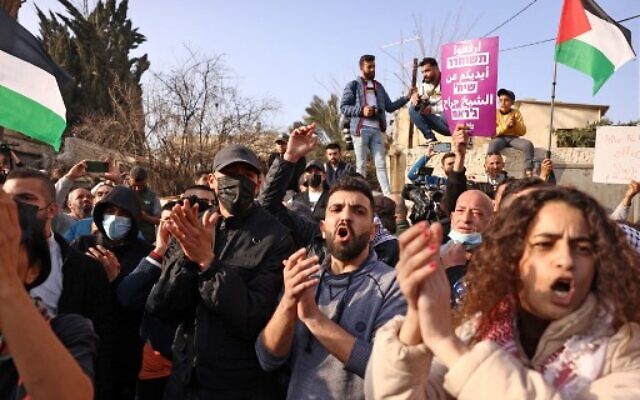
While West Bank tensions rise, Jerusalem sees a quiet Ramadan – for now
Just last year, clashes in Jerusalem were the first domino to fall in a series of events that led to a bloody war between Israel and Hamas. But even as central Israeli cities and the northern West Bank have seen a wave of Palestinian terror attacks and Israeli army raids in recent weeks, the contested capital has stayed quiet.
The situation in Jerusalem remains as tense as ever, of course. Fourteen people have been killed in four terror attacks across Israel since late March. Israeli forces have stepped up raids and arrests across the West Bank, leading to repeated clashes with Palestinians.
Fifteen Palestinians across the West Bank have died in clashes with Israeli soldiers in the past two weeks. Several were terror group members killed in firefights with troops, while others were apparently unarmed civilians killed by mistake.
“When is the storm coming? Nobody knows. But the weather is bad,” said dissident Fatah activist Samer Sinijlawi, who is close to exiled Palestinian leader Mohammad Dahlan.
The simmering flames across the West Bank may soon ignite Jerusalem. Even more worrisome, the Muslim holy month of Ramadan this year coincides with the major Jewish and Christian holidays of Passover and Easter, which officials warned for months might spark an escalation.
And yet for now, the city remains quiet. During the first few days of Ramadan, scattered clashes erupted between Palestinians and police at Damascus Gate, resulting in some injuries and arrests. But the violence in the city has died down to a whimper over the past few days, even as it has spread like wildfire across the West Bank.
Some of the most resonant issues that brought Palestinians out into Jerusalem’s streets last year were defused going into this year’s Ramadan. Last year, Palestinians on the verge of eviction by nationalist Jewish groups in the neighborhood of Sheikh Jarrah rallied Palestinians both in the city and around the world.
But Israeli courts in March suspended several of the pending evictions – including for the four families whose court case helped spark the Gaza war in May of last year. Another family, the Salems, saw their eviction frozen by court order after they were originally set to be removed in April.
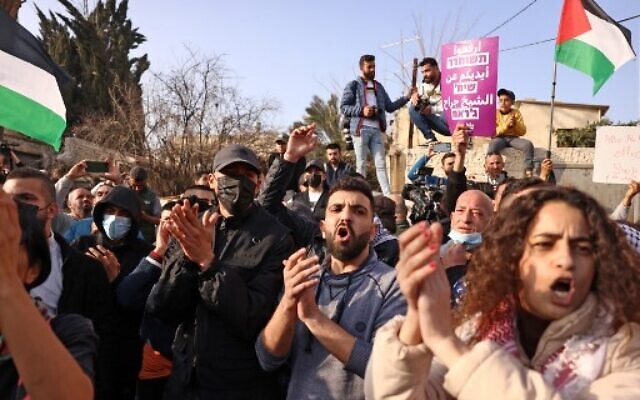
Palestinians and activists take part in a protest in Jerusalem’s flashpoint east neighbourhood of Sheikh Jarrah on February 18, 2022. (Photo by RONALDO SCHEMIDT / AFP)
American and Arab diplomats have eyed this April with apprehension since last year’s war. While no one predicted the recent string of deadly terror attacks, Arab, Israeli, and United States officials shuttled between their capitals in an attempt to ensure that the month passed calmly, with much of the focus on Jerusalem.
On the ground, Israeli police also appear to have learned lessons from last year’s Jerusalem escalation.
Officers have notably shied away from the iron-fisted tactics of past years. Instead of firing water cannons at bottle-throwing Palestinian teenagers, police have waded into the crowd and detained individuals.
Police Superintendent Amir Ben-Kiki called the police’s response “proportionate.” Officers aimed to arrest rioters while ensuring that worshipers and shopkeepers were undisturbed, Ben-Kiki said.
“We acted in a precise way against those who violated the law,” said Ben-Kiki, a senior police commander in the force’s East Jerusalem division, in a phone interview last week.
The nightly clashes have not been free of footage showing police violence. In some videos, club-wielding officers can be seen grabbing and beating Palestinians for little apparent cause.
Even so, the contrast with last Ramadan is stark. The nighttime violence that engulfed the capital in April began with an ill-advised police action: cordoning off the Damascus Gate steps and preventing Palestinians from sitting there during the long, hot Ramadan nights.
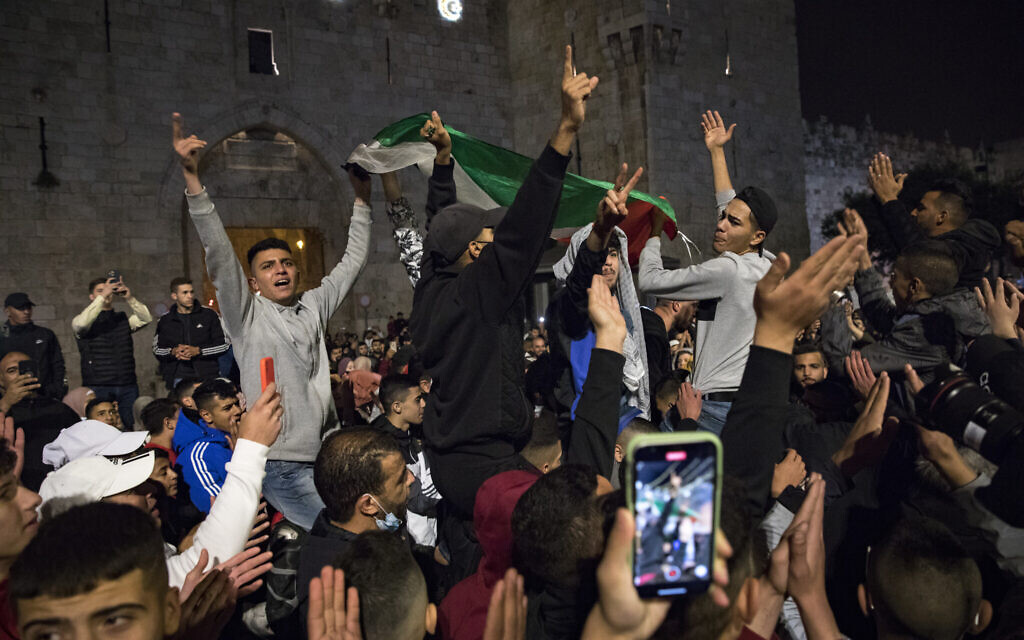
Palestinians gather and wave a Palestinian flag at Damascus Gate in Jerusalem’s Old City, during the holy Muslim month of Ramadan, April 26, 2021. (Olivier Fitoussi/Flash90)
Israeli police spokespeople described the barricades last year as an attempt at preemptive riot control. Many Palestinians saw it as an assault on a prized Jerusalem tradition: during Ramadan, Damascus Gate is transformed into Palestinian Jerusalem’s festive, buzzing downtown.
But night after night, Israeli police fired endless streams of foul-smelling bilge water over the worn stones of the Damascus Gate plaza in an attempt to disperse Palestinians. Officers hurled sound grenades at protesters with abandon, while Palestinians threw water bottles and rocks at armored jeeps.
Police argued the harsh tactics were necessary to effectively crack down on Palestinian rioters. But they seemed to have the opposite effect, galvanizing more Palestinians to join the nightly clashes and raising tensions across the city.
“Damascus Gate is a major commercial center. If you can achieve the same result with quieter means, without it being seen as weakness — why not?” said former senior police officer Aharon Aksol, who led Israel Police’s Operations Division before retiring in 2016.
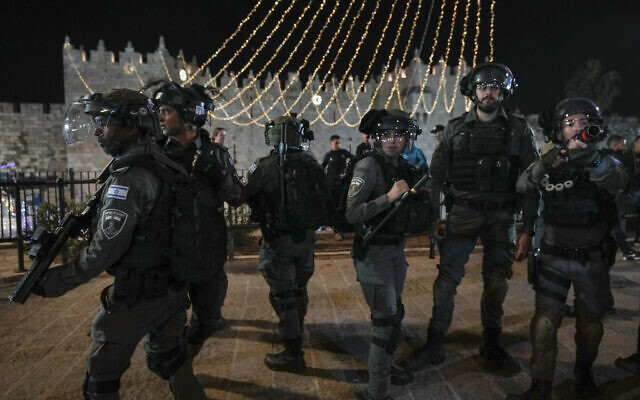
Israeli border police officers take position during clashes between Israeli security forces and Palestinians next to Damascus Gate, outside the Old City of Jerusalem, during the Muslim holy month of Ramadan, Monday, April 4, 2022. (AP Photo/Mahmoud Illean)
One of the most striking images to emerge from the recent clashes has been an almost absurd split screen. On one side of the street, limited clashes between a few dozen young men and troops. But in the surrounding alleys and in the main plaza, the vast majority of Palestinians in the area simply move on with the holiday celebrations.
“For forty or so kids, you don’t need all the water cannons and the sound grenades. That way, you make the event into much more than it already is,” said Aksol.
Fatah activist Sinjilawi allowed that there had been an apparent change in police tactics.
“For now, they haven’t used sound grenades or water cannons. This is the result of pressure from the Israeli government,” Sinjilawi said.
A second former senior police officer, reached for comment about the relative calm in Jerusalem, was quick to dismiss the notion: “Don’t draw your conclusions too soon.”
The greatest challenge in the city, after all, is still to come this weekend. On Friday, tens of thousands of West Bank Palestinians will enter to pray at the Al-Aqsa Mosque, the third holiest shrine in Islam. Jews revere the same hilltop as the holiest site in their tradition, on which both Biblical temples were built.
Most of the Ramadan worshipers will cross into Israel without permits, part of a policy to loosen normally tight Israeli restrictions on Palestinian movement for the holiday.
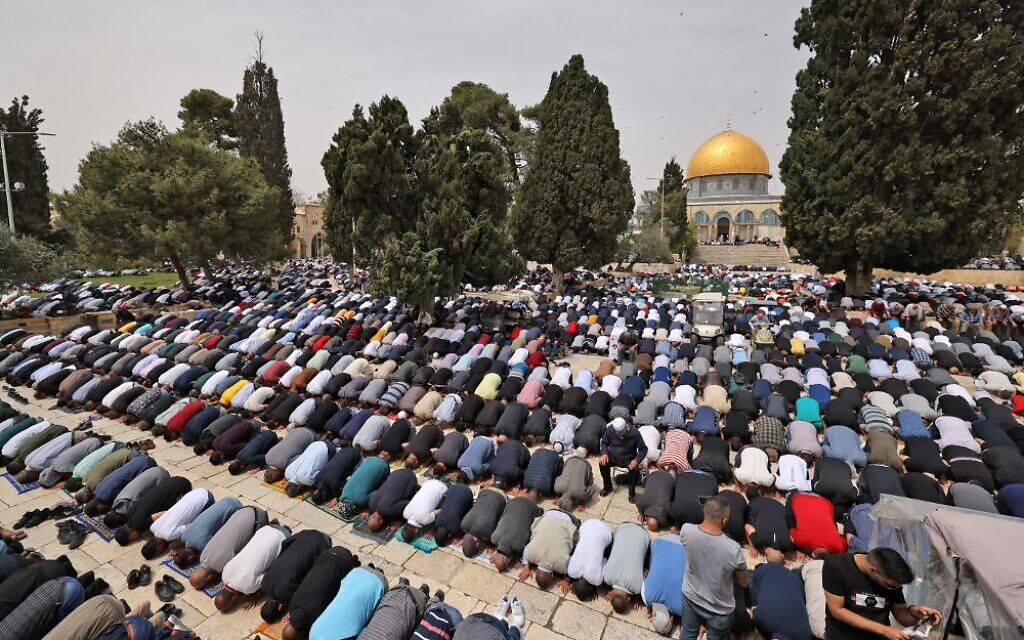
Palestinians attend afternoon prayers on the Temple Mount, which houses the Al-Aqsa Mosque, in Jerusalem’s Old City, on April 8, 2022, during the first Friday of the Muslim holy month of Ramadan. (Ahmad Gharabli/AFP)
From the Israeli perspective, the policy carries a clear security risk. But if authorities clamp down on Palestinians seeking to worship freely during the holy month, it could escalate the situation still further.
“Once I open up the gate for West Bankers to enter into Jerusalem, there’s absolutely a risk here,” said former senior Israeli Shin Bet official Arik Barbing. But he added that he supported “taking that risk” despite the rising tensions.
Jewish nationalists, meanwhile, have vowed to ascend to the Temple Mount on Sunday. Some of the most extreme have vowed to attempt to sacrifice goats according to the Biblically mandated Passover sacrifice, an announcement that inflamed tensions with Palestinians.
Hamas and other Gaza-based terror groups have repeatedly invoked the flashpoint holy site as a red line. Last year, clashes at the site preceded heavy Israeli police raids that together provided the final spark necessary for the outbreak of war.
Israeli police are likely to block the would-be sacrificers, as they have in years past. But their calls have already gained enormous traction in Palestinian media, which has resounded with headlines over the matter.
“You keep testing this nerve, this very sensitive nerve. You keep pouring gunpowder onto the fire — and you can’t control the result,” said Sinijlawi.
For now, it seems, Israel can register one minor point in its favor amidst the current terror wave: Jerusalem is not yet ablaze. But if and when rising tensions again transform the city into a battleground, we can imagine that Gaza may not be far behind.
